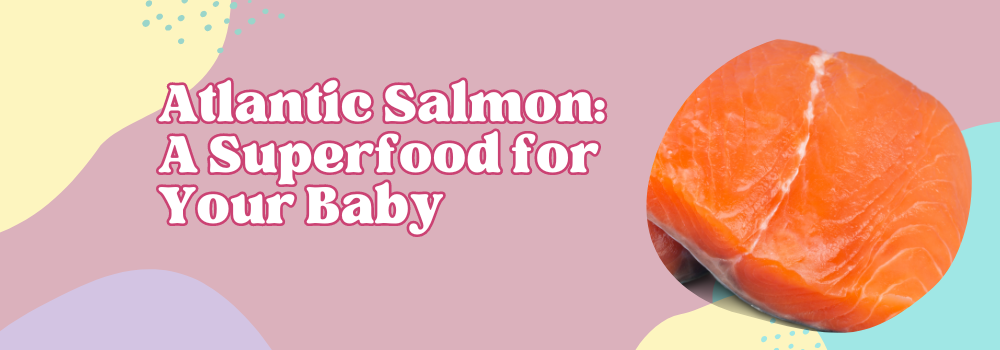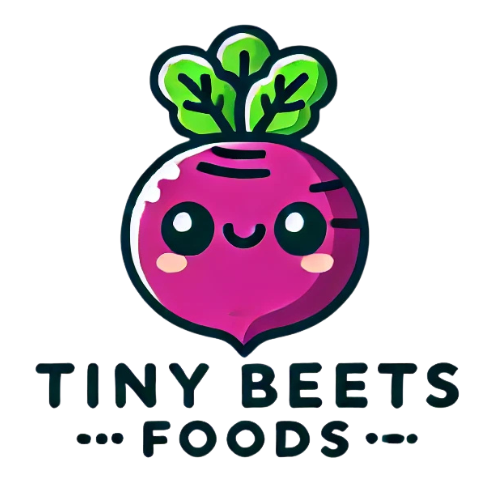
Introducing solid foods to your baby’s diet can be both exciting and daunting. You want to ensure that every bite is packed with the nutrients necessary for their growth and development. One food that stands out as a nutritional powerhouse is Atlantic salmon. This fish is not only delicious but also brimming with essential nutrients that support various aspects of your baby’s health. In this comprehensive guide, we’ll delve into why Atlantic salmon is a superfood for your baby and how you can incorporate it into their diet.
Brain Booster 🧠✨
Atlantic salmon is rich in DHA, an omega-3 fatty acid that supports brain development. Let’s help our little ones become little geniuses!
The Role of DHA in Brain Development
DHA (docosahexaenoic acid) is a type of omega-3 fatty acid that is crucial for brain health. It makes up a significant portion of the brain's gray matter and is essential for the growth and functional development of the brain in infants. Regular consumption of DHA-rich foods like Atlantic salmon can enhance cognitive function, improve learning abilities, and support overall mental health.
Cognitive Benefits of DHA
Numerous studies have shown that adequate intake of DHA during infancy is associated with improved cognitive performance, better memory, and advanced problem-solving skills. By incorporating Atlantic salmon into your baby’s diet, you are providing them with the building blocks for a sharp and active mind.
Strong Bones and Teeth 🦷💪
Packed with Vitamin D and Calcium, Atlantic salmon helps build strong bones and teeth, ensuring your baby’s smile stays bright and healthy!
Importance of Vitamin D
Vitamin D is essential for the absorption of calcium, which is necessary for the development of strong bones and teeth. Atlantic salmon is one of the few natural food sources rich in vitamin D. This vitamin helps regulate the amount of calcium and phosphate in the body, which are critical for maintaining healthy bones and teeth.
Calcium for Bone Health
Calcium is the primary mineral found in bones and teeth. During the first year of life, your baby’s bones are rapidly growing, making adequate calcium intake crucial. Atlantic salmon provides a good amount of calcium, contributing to the structural integrity and strength of your baby’s skeletal system.
Immune System Hero 🛡️🌟
Full of Vitamins and Antioxidants, Atlantic salmon boosts your baby’s immune system, keeping those pesky colds away.
Vitamin A and Immune Function
Vitamin A is vital for maintaining a healthy immune system. It helps in the production and function of white blood cells, which are crucial for fighting off infections. Atlantic salmon is a good source of vitamin A, providing your baby with the nutrients needed to fend off illnesses.
Selenium as an Antioxidant
Selenium is a powerful antioxidant that helps protect cells from damage. It plays a key role in maintaining a healthy immune system by enhancing the body’s ability to combat infections and reduce inflammation. Including Atlantic salmon in your baby’s diet ensures they get enough selenium to support their immune health.
Protein Powerhouse 🌱💥
High-quality protein in Atlantic salmon supports muscle growth and overall development, giving your baby the strength to explore the world!
Importance of Protein for Babies
Protein is a fundamental nutrient required for the growth and repair of tissues. It is essential for the development of muscles, organs, and the immune system. Atlantic salmon is an excellent source of high-quality protein, providing all the essential amino acids necessary for your baby’s development.
Muscle Growth and Repair
During infancy, your baby’s body is in a constant state of growth and repair. Adequate protein intake ensures that their muscles develop properly and that they have the strength to engage in physical activities. The protein in Atlantic salmon supports muscle growth, giving your baby the energy and strength they need to thrive.
Rich in Essential Nutrients 🥣
Atlantic salmon is packed with a wide range of essential nutrients that contribute to your baby’s overall health and well-being.
B Vitamins for Energy and Metabolism
B vitamins found in Atlantic salmon, including B12, niacin, and riboflavin, play a crucial role in energy production and metabolism. These vitamins help convert food into energy, support healthy skin and eyes, and promote brain function. Ensuring your baby gets enough B vitamins supports their overall growth and development.
Omega-3 Fatty Acids for Heart Health
In addition to DHA, Atlantic salmon is rich in other omega-3 fatty acids, such as EPA (eicosapentaenoic acid), which support heart health. Omega-3s help reduce inflammation, lower blood pressure, and improve overall cardiovascular function. Starting a heart-healthy diet early can have long-term benefits for your baby’s health.
Potassium for Fluid Balance
Potassium is an essential mineral that helps maintain fluid balance, regulate muscle contractions, and support nerve function. Atlantic salmon provides a good amount of potassium, ensuring that your baby’s body functions properly and stays hydrated.
Versatility in Cooking
Atlantic salmon is incredibly versatile and can be prepared in various ways to suit your baby’s taste and texture preferences. Here are a few simple and delicious recipes to get you started:
Salmon Puree
Ingredients:
- 1 small fillet of Atlantic salmon
- 1 cup of water or low-sodium broth
- A pinch of dill (optional)
Instructions:
- Remove the skin and any bones from the salmon fillet.
- In a small pot, bring water or broth to a boil.
- Add the salmon fillet and cook until fully cooked, about 10 minutes.
- Transfer the cooked salmon to a blender or food processor.
- Blend until smooth, adding more water or broth if needed to reach the desired consistency.
- Allow the puree to cool before serving.
Salmon and Vegetable Mash
Ingredients:
- 1 small fillet of Atlantic salmon
- 1 carrot, peeled and chopped
- 1 small potato, peeled and chopped
- 1 cup of water or low-sodium broth
Instructions:
- Remove the skin and any bones from the salmon fillet.
- In a pot, bring water or broth to a boil.
- Add the chopped carrot and potato and cook until soft, about 15 minutes.
- Add the salmon fillet and cook until fully cooked, about 10 minutes.
- Transfer the cooked salmon and vegetables to a blender or food processor.
- Blend until smooth, adding more water or broth if needed to reach the desired consistency.
- Allow the mash to cool before serving.
Salmon and Sweet Potato Bites
Ingredients:
- 1 small fillet of Atlantic salmon
- 1 sweet potato, peeled and grated
- 1 egg yolk
Instructions:
- Remove the skin and any bones from the salmon fillet and flake the salmon into small pieces.
- In a bowl, combine the grated sweet potato, flaked salmon, and egg yolk.
- Mix well to combine.
- Form small patties or bite-sized balls with the mixture.
- In a non-stick pan, cook the patties over medium heat until golden brown on both sides and fully cooked through, about 3-4 minutes per side.
- Allow the bites to cool before serving.
Don't Want To Cook?
Fresh Atlantic Salmon, Whitebean & Carrot
Allergies and Precautions
While Atlantic salmon is generally safe for babies, it’s important to introduce it gradually and watch for any signs of allergies. Symptoms of a fish allergy may include hives, swelling, or difficulty breathing. If you notice any of these symptoms, consult your pediatrician immediately. Additionally, ensure that the salmon is thoroughly cooked to avoid any potential foodborne illnesses.
Tips for Introducing Atlantic Salmon
Introducing new foods to your baby can be a fun and rewarding experience. Here are some tips to make the process smooth:
- Start Slow: Begin with small amounts of salmon puree and gradually increase the quantity as your baby gets used to the new taste and texture.
- Mix and Match: Combine salmon with familiar foods like sweet potatoes or carrots to make the transition easier.
- Observe and Adapt: Watch for any signs of discomfort or allergies and adjust accordingly. Every baby is different, so it’s essential to tailor the introduction to your baby’s needs.
- Stay Consistent: Consistency is key. Offer salmon regularly to help your baby develop a taste for it.
Frequently Asked Questions
Q: When can I start feeding my baby Atlantic salmon?
A: Atlantic salmon can be introduced to your baby’s diet around 6 months of age, once they are ready for solid foods. Always consult your pediatrician before introducing new foods.
Q: How should I prepare Atlantic salmon for my baby?
A: Atlantic salmon can be prepared in various ways, such as purees, mashes, or mixed with vegetables. Ensure it is thoroughly cooked and blended to a smooth consistency for easy digestion.
Q: Is Atlantic salmon safe for babies with sensitive stomachs?
A: Yes, Atlantic salmon is generally gentle on the stomach and can help prevent digestive issues due to its high nutrient content. However, it’s important to introduce it gradually and observe your baby’s reaction.
Conclusion
Atlantic salmon is a fantastic addition to your baby’s diet, offering a wide range of health benefits from boosting brain development to supporting strong bones and a healthy immune system. Packed with essential nutrients, easy to digest, and incredibly versatile in cooking, Atlantic salmon is truly a superfood for your little one. By incorporating this nutritious fish into your baby’s meals, you
